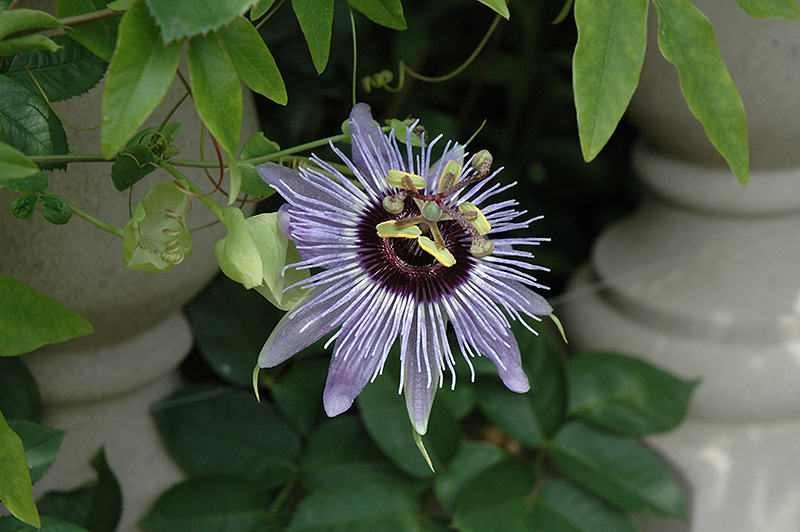Blue Bouquet Passion Flower
Passiflora 'Blue Bouquet'
Height: 10 feet
Spread: 24 inches
Sunlight:
![]()
Hardiness Zone: 6
Description:
Without a doubt one of the more spectacular vines for the garden; the large flowers are showy and distinctive, with their oddly-shaped stamens and pistils; wonderful for covering an arbor, trellis or lattice, the flowers are individually beautiful
Ornamental Features
Blue Bouquet Passion Flower features showy lightly-scented powder blue star-shaped flowers with deep purple eyes and purple anthers at the ends of the branches in mid summer. The flowers are excellent for cutting. It has dark green deciduous foliage. The compound leaves do not develop any appreciable fall colour.
Landscape Attributes
Blue Bouquet Passion Flower is a multi-stemmed deciduous woody vine with a twining and trailing habit of growth. Its average texture blends into the landscape, but can be balanced by one or two finer or coarser trees or shrubs for an effective composition.
This is a relatively low maintenance woody vine, and is best cleaned up in early spring before it resumes active growth for the season. It has no significant negative characteristics.
Blue Bouquet Passion Flower is recommended for the following landscape applications;
- Accent
- Hedges/Screening
- General Garden Use
Planting & Growing
Blue Bouquet Passion Flower will grow to be about 10 feet tall at maturity, with a spread of 24 inches. As a climbing vine, it tends to be leggy near the base and should be underplanted with low-growing facer plants. It should be planted near a fence, trellis or other landscape structure where it can be trained to grow upwards on it, or allowed to trail off a retaining wall or slope. It grows at a fast rate, and under ideal conditions can be expected to live for approximately 10 years.
This woody vine should only be grown in full sunlight. It does best in average to evenly moist conditions, but will not tolerate standing water. It is not particular as to soil type, but has a definite preference for alkaline soils. It is somewhat tolerant of urban pollution. Consider applying a thick mulch around the root zone in winter to protect it in exposed locations or colder microclimates. This particular variety is an interspecific hybrid.

